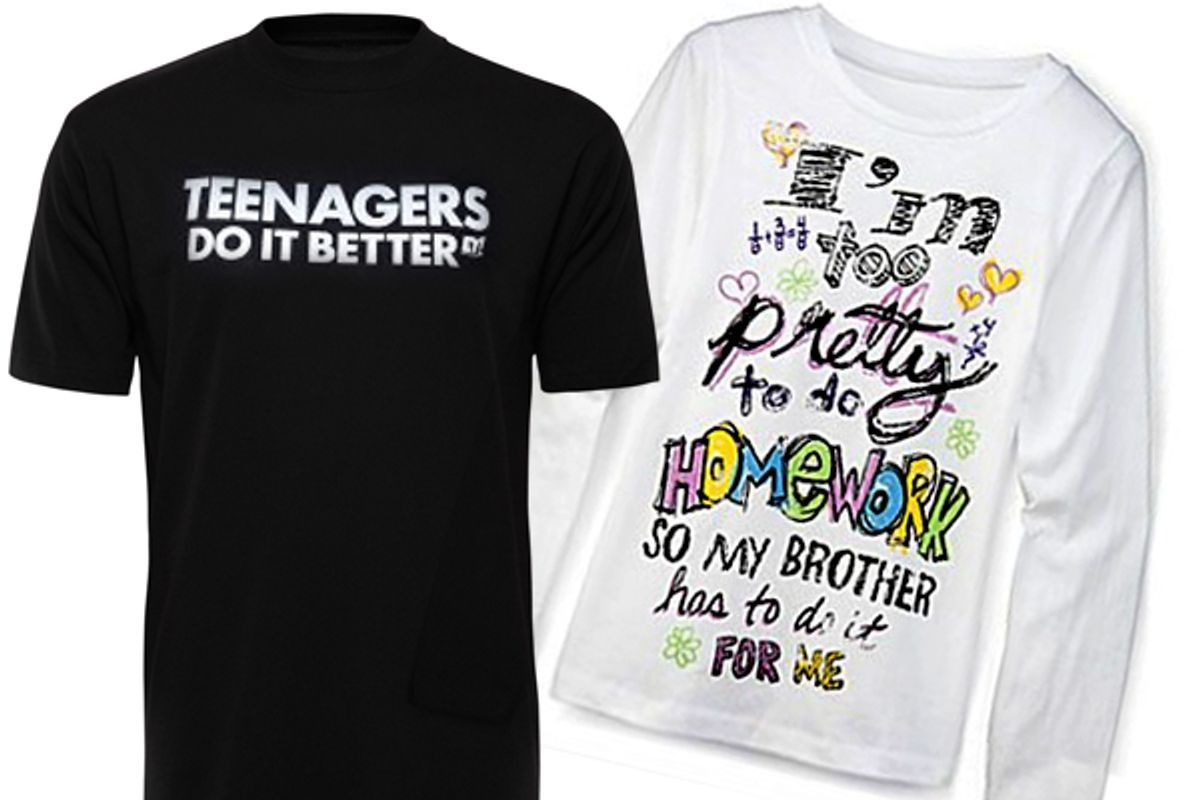JCPenney became the latest retailer to make itself the target of protests this week when it offered a T-shirt, aimed at preteen and teenage girls, emblazoned with the words "I'm too pretty to do homework so my brother does it for me." As has happened with similar offerings over the last decade, protests fell swiftly into shape. A Change.org petition denouncing the shirt garnered thousands of signatures, bloggers like those at Gawker Media's Jezebel turned the tacky offering into a national story, and inevitably, JCPenney announced that it was pulling the shirt from its back-to-school collection.
Besides the fact that the slogan doesn't really make much sense -- not that we want girls to use their looks instead of their heads, but shouldn't they woo peers and not siblings? -- the predictable flap illustrates a larger truth. If you're trying to make money by getting people to plaster ridiculous sayings across their chests, it's better to go surreal or silly than stereotypical.
Why do supposedly ironic T-shirts touch so many sincere cultural buttons? After all, a shirt that asks passersby "Who Wants a Mustache Ride?" -- to name one novelty tee on the market -- might be crude. But it's hard to believe that anyone would don it in the expectation that it's an effective sexual solicitation. Similarly, it would be pretty depressing if someone wore a shirt that said "I Drink Beer Like It's My Job," also widely available, and meant it. Nevertheless, it doesn't take a high-level humorist to tell that it's a joke. "All the Cool Kids Go to Rehab" might not be terribly funny, given the way the celebrity industry treats addiction and rehabilitation as recurring and sometimes trivial parts of the news cycle. But it's more depressing than offensive, an attempt to glamorize hitting rock bottom, and not a particularly effective one at that.
But retailers go wrong when they treat stereotypes and social issues as if they're distant enough to be the subject of casual humor. In August, American Apparel began selling a shirt that proclaims "Teenagers Do It Better." It simply reminded many people that Dov Charney, the company's CEO, has faced sexual harassment charges from many young women.
Abercrombie & Fitch found itself in trouble in 2002 when it started selling a T-shirt advertising a "Wong Brothers Laundry Service -- Two Wongs Can Make It White." It wasn't just that that the top played into the idea that laundries are an exclusively Asian industry -- which might have been enough to invite protest -- but it also implied an inequality between white customers and the people of color from whom they buy services they wouldn't perform themselves. Similarly, if less perniciously, the chain sold an "It's all relative in West Virginia" shirt in 2004 that prompted protests from the state's governor on the grounds that it reinforced stereotypes of the region as a place full of casual incest.
Another chain that's found itself repeatedly in the hot seat for its T-shirts – perhaps intentionally to cement its edginess -- is Urban Outfitters. In 2003, the company found itself under fire from the Anti-Defamation League for selling a top emblazoned with the slogan "Everyone Loves a Jewish Girl," with dollar signs surrounding the words. Worn by actual Jewish girls, the shirt could have been self-aware and funny, but the association of Judaism with the perception of avarice is still a stereotype that provokes anxiety. Last year, the company pulled back a T-shirt with the slogan "Eat Less" -- the words were taken as an uncomfortable promotion of unhealthy approaches to eating. In that case, the debate was particularly fraught because Urban Outfitters introduced its shirt shortly after gossip blogger Perez Hilton started selling (and then withdrew) a T-shirt with the words "Nothing Tastes ss Good as Skinny Feels." Kate Moss popularized the line in a 2009 interview and it has since become associated with websites that advocate radical weight-loss measures.
It would be wonderful to think we live in a world where the idea that a girl or a woman would prioritize her body over her brain is so ludicrous that it could never be taken seriously. But when the message that women ought to embrace that hierarchy of values is delivered so relentlessly and through so many channels, JCPenney should have realized that its supposedly clever slogan was too on the nose to be worn on anybody's body as a joke.



Shares